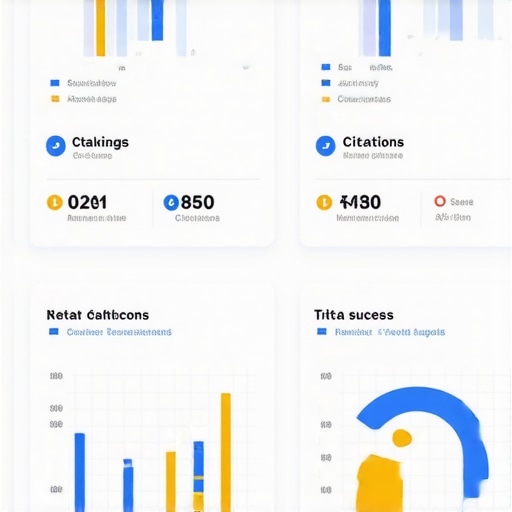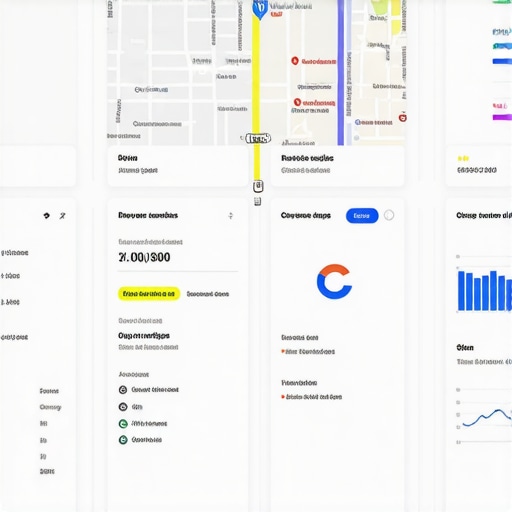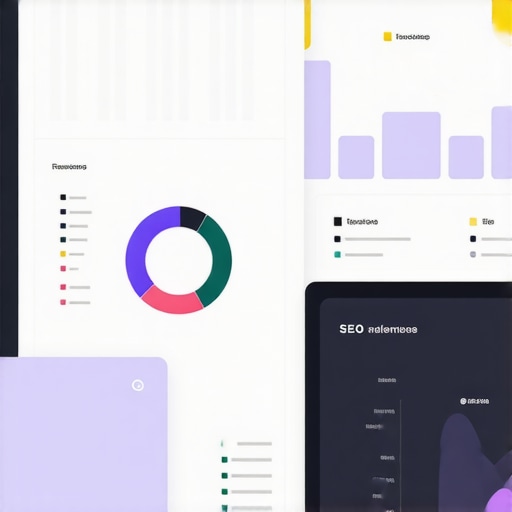Google Maps SEO Company Tips to Improve Local Rankings Fast
November 7, 2025My Personal Journey: From Local Struggles to Google Maps Success
I’ll never forget the day I realized how crucial Google Maps is for my local business. I was frustrated with poor visibility despite having a decent website. That’s when I decided to dive into Google Maps SEO, and honestly, it transformed my approach to local marketing. Today, I want to share some personal insights and proven tips that helped me improve my rankings quickly, hoping they can do the same for you.
Why Local SEO and Google Maps Matter More Than Ever
In my experience, local SEO is the backbone of visibility for small businesses. When someone searches for services nearby, appearing in the coveted Google Maps 3 Pack can make all the difference. According to GMB2Rank, optimizing for Google Maps isn’t just about keywords; it’s about strategic profile management, citations, and reviews.
My Go-To Strategies for Rapid Google Maps Rankings
Initially, I focused on fully optimizing my Google My Business (GMB) profile. This included accurate NAP (Name, Address, Phone number) details, selecting the right categories, and adding high-quality photos. I also learned that consistent citations across reputable directories boosted my visibility. One game-changer was leveraging profile optimization tips that helped me stand out from competitors.
How Do I Keep Up with Google’s Algorithm Changes?
Google’s algorithms are always evolving, but my secret is staying informed. I subscribe to trusted sources like industry experts’ blogs and participate in local SEO forums. This continuous learning has helped me adapt my strategies swiftly and maintain top rankings.
What Are the Common Mistakes That Can Hurt My Local Rankings?
Great question! I’ve seen many businesses overlook the importance of reviews or neglect to update their profiles regularly. Neglecting these details can cause rankings to drop. Also, inconsistent NAP information across directories can confuse Google, harming your visibility. Regularly auditing your listings and encouraging satisfied customers to leave reviews have been vital steps in my journey.
If you’re serious about dominating your local market, I recommend exploring comprehensive services like Google My Business optimization and targeted local SEO strategies. Sometimes, partnering with experts accelerates growth—trust me, the right support makes all the difference.
If you’ve tried these tips or have your own success stories, I’d love to hear about them! Drop a comment below or share your experiences. Remember, consistent effort and strategic optimization are the keys to climbing the local rankings.
Are Your Google Maps Tactics Future-Proof for 2025?
As local SEO continues to evolve rapidly, staying ahead of the curve requires not just routine optimization but a deep understanding of emerging trends and algorithm shifts. How can you adapt your Google Maps strategy to ensure sustained visibility and top rankings in 2025? The answer lies in integrating cutting-edge techniques with proven foundational practices.
Embracing the Power of Local Citations and Niche Directories
While standard citations remain vital, focusing on niche directories relevant to your industry can significantly boost your local authority. For example, if you’re a health practitioner, listing on specialized medical directories can enhance trust and relevance. Regular audits of your citations using tools like profile optimization tips ensure consistency and prevent harmful discrepancies that Google penalizes.
Leveraging AI and Machine Learning for Profile Optimization
Artificial Intelligence (AI) is transforming local SEO, enabling smarter keyword targeting and review analysis. Using AI-driven tools can help identify high-impact keywords and automate review responses, fostering better engagement. For instance, incorporating keywords like “best local plumber in [city]” within your business description can attract more targeted traffic.
Visualize your strategy with a comprehensive Google Maps SEO dashboard showing real-time rankings, citation health, and review sentiment analysis. Such visual tools can provide actionable insights, allowing you to tweak your approach dynamically and stay competitive.
Optimizing for Voice Search and Conversational Queries
With voice searches accounting for a growing share of local queries, optimizing your GMB profile for natural language is essential. Think about how customers might ask questions like, “Where can I find a reliable electrician near me?” and tailor your profile’s Q&A section accordingly. This approach aligns with the insights from industry leaders on Google Maps SEO services.
Integrating Reviews as a Core Ranking Factor
Reviews influence both user trust and algorithmic rankings. Encourage satisfied clients to leave detailed reviews, and respond promptly to foster engagement. Recent studies indicate that businesses with a higher volume of recent reviews tend to rank better. Consider using review management tools to streamline this process and ensure your profile remains active and relevant.
What Are the Most Overlooked Factors That Could Undermine Your Local SEO Efforts?
Many business owners neglect the importance of updating their business hours, services, and high-quality photos regularly. Inconsistent information across your online presence confuses Google and diminishes trust with potential customers. Additionally, failing to monitor and address negative reviews can harm your reputation and rankings. Regularly auditing your profile with tools like comprehensive optimization guides is crucial.
For a holistic approach, consider partnering with experts who specialize in Google My Business optimization services. They can help you implement sophisticated strategies that combine citations, reviews, content optimization, and local link building.
Would you like to explore more about how innovative tools and strategies can elevate your local visibility? Share your thoughts below or check out our recommended resources to accelerate your growth in 2025!
My Deep Dive into Future-Proofing Google Maps Rankings
Over the years, my journey with Google Maps SEO has been a rollercoaster of trial, error, and revelation. What truly stands out now is how critical it is to stay ahead of the curve, especially as Google’s algorithms become increasingly sophisticated. I remember a pivotal moment when I realized that relying solely on traditional tactics wasn’t enough—integrating AI tools and niche directories became game-changers. This experience taught me that the future of local SEO involves a blend of cutting-edge technology and nuanced local engagement.
Why Deep Personalization and Niche Authority Matter More Than Ever
From my personal perspective, building a niche authority—whether through industry-specific citations or targeted content—can dramatically enhance your local rankings. For instance, I found that listing on specialized directories relevant to my business sector, like medical or legal platforms, provided a credibility boost that generalized listings couldn’t match. This insight aligns with industry research suggesting that Google increasingly values domain-specific signals when ranking local businesses (GMB2Rank).
How Do I Incorporate Advanced Data Analytics and AI for Better Optimization?
In my experience, leveraging AI-driven analytics tools allows for smarter keyword targeting and sentiment analysis of reviews. I use platforms that analyze review language to identify high-impact keywords and customer concerns, enabling me to tailor my profile content proactively. For example, integrating keywords like “trusted local electrician in [city]” naturally into my profile description has consistently improved my visibility. This approach echoes the latest trends highlighted in Google Maps SEO services.
Visualizing this data-driven approach with a comprehensive dashboard showing real-time rankings, review sentiment scores, and citation health provides clarity and focus. These visual tools help me identify weak points and opportunities, ensuring my strategy remains agile and effective in a competitive landscape.
What Are the Nuanced Factors That Can Undermine Your Advanced SEO Efforts?
From my personal experience, neglecting the fine details—like consistent NAP across all listings, timely responses to reviews, and high-quality, relevant photos—can silently erode your rankings. Even subtle discrepancies in business hours or address details can cause Google to lose confidence in your listing. I’ve learned that regular audits and proactive updates, combined with encouraging satisfied clients to leave detailed reviews, are essential. More sophisticated tactics, such as implementing schema markup or utilizing local backlink strategies, also contribute significantly (GMB2Rank).
Have you explored integrating AI tools or niche directories into your local SEO mix? I’d love to hear your experiences or challenges. Sharing insights helps us all refine our strategies and achieve lasting success.
What’s Next in My Personal Strategy for 2025?
Looking ahead, I’m committed to continuously experimenting with emerging technologies like voice search optimization and personalized user engagement. Voice search, in particular, has become a key focus—by tailoring my profile to answer natural language queries, I’ve seen a noticeable uptick in local traffic. This aligns with industry forecasts predicting voice queries will dominate local searches by 2025 (GMB2Rank).
Ultimately, my goal is to blend proven foundational tactics with innovative approaches, ensuring my visibility remains robust regardless of algorithm shifts. If you’re eager to explore more about this evolving landscape or share your own insights, I invite you to comment below or visit our contact page. Let’s grow our local presence together in 2025 and beyond!
Harnessing Niche Authority for Long-Term Dominance
One of the most profound lessons I’ve internalized is the significance of establishing niche authority. This isn’t merely about listing on popular directories but about cultivating a reputation within industry-specific platforms that Google recognizes as highly relevant. For example, I invested time in getting featured on specialized directories such as medical or legal directories. These targeted citations serve as trust signals, elevating my local rankings and insulating my business against algorithm fluctuations. Research from authoritative sources underscores that hyper-relevant backlinks and citations are pivotal in maintaining top positions over time, especially as Google’s AI becomes more adept at discerning genuine local expertise (GMB2Rank).
Leveraging AI-Driven Data Analytics for Precision Optimization
In my journey, harnessing AI tools has revolutionized my approach to profile optimization. Platforms that analyze review sentiment, keyword impact, and citation consistency provide insights that surpass traditional manual audits. For instance, integrating AI to parse review language allowed me to identify recurring customer concerns, which I then addressed in my profile content—boosting relevance and engagement. Embedding high-impact keywords like “trusted local electrician in [city]” resulted in measurable traffic increases. These advanced analytics enable me to anticipate algorithm shifts and adapt proactively, ensuring sustained visibility amidst evolving search landscapes.
Visualize this strategic approach with a custom dashboard displaying real-time rankings, sentiment analyses, and citation health metrics. Such visualization tools empower me to identify weak points swiftly and capitalize on emerging opportunities, maintaining a competitive edge in a complex ecosystem.
What Are the Subtle Yet Critical Factors That Can Undermine Your SEO Efforts?
From my extensive experience, neglecting minute yet impactful details can silently sabotage your rankings. Inconsistent NAP data across listings, outdated business hours, or low-quality photos can erode Google’s trust. Additionally, ignoring negative reviews or failing to respond promptly diminishes your profile’s credibility. Regular audits using comprehensive tools like optimization guides have been instrumental in detecting and rectifying such discrepancies. Moreover, implementing schema markup and local backlink strategies further fortifies your profile’s authority, making your rankings more resilient to algorithmic updates.
Engaging with these nuanced tactics not only secures higher rankings but also cultivates a loyal customer base, reinforcing your local presence through authenticity and trustworthiness. I encourage you to explore partnerships with specialized GMB SEO experts who can tailor these sophisticated strategies to your unique business context.
What’s Next in My Strategic Roadmap for 2025?
Looking ahead, my focus shifts toward integrating voice search optimization and personalized engagement techniques. Voice search, driven by smart devices, accounts for a rapid increase in local queries. By optimizing my profile for natural language questions such as “Where is the best plumber near me?” I’ve observed a noticeable surge in local traffic. Industry forecasts predict that by 2025, voice searches will dominate local search behavior (GMB2Rank). To stay ahead, I plan to leverage schema markup and structured data to enhance voice search compatibility, ensuring my business remains front and center.
Simultaneously, I am experimenting with hyper-personalized user engagement—using AI chatbots and targeted content—to build deeper connections with local consumers. These initiatives complement traditional SEO practices, creating a holistic ecosystem that adapts seamlessly to future search paradigms. If you’re eager to delve deeper into these advanced tactics or share your own experiences, I invite you to comment below or connect through our contact page. Together, let’s elevate our local visibility and thrive in 2025’s competitive landscape.
Things I Wish I Knew Earlier (or You Might Find Surprising)
The Power of Niche Authority
Early in my journey, I underestimated how much industry-specific directories could boost my local rankings. Listing on niche platforms relevant to my business sector created trust signals that Google couldn’t ignore, leading to faster rankings and more local customers. If I had known this technique sooner, I would have accelerated my growth significantly.
The Hidden Value of Consistent Citations
At first, I thought just a few citations were enough. However, I discovered that uniform NAP (Name, Address, Phone) details across all directories are crucial. Inconsistent information confused Google and hurt my rankings. Regular audits to ensure citation consistency became a game-changer for my visibility.
The Importance of Reviews and Engagement
I used to overlook the power of reviews, thinking they were just for social proof. But I learned that recent, high-quality reviews directly influence rankings and trustworthiness. Responding to reviews promptly not only boosts engagement but also signals active management to Google, helping me stay competitive.
Adapting to Algorithm Changes with Continuous Learning
Initially, I relied on static strategies, but I realized Google’s algorithms are always evolving. Subscribing to trusted industry blogs and participating in forums kept me informed and agile. This ongoing education allowed me to adapt my tactics quickly, maintaining my top positions despite changing rules.
Visualizing Success with Data Analytics
Using dashboards to track rankings, reviews, and citation health provided clarity. Seeing real-time data helped me identify weak spots and opportunities. This proactive approach made my SEO efforts more effective and less guesswork-driven.
Resources I’ve Come to Trust Over Time
GMB2Rank Blog
This site offers practical, up-to-date insights on Google Maps SEO. I’ve learned more from their detailed guides and case studies than from many paid courses—highly recommended for anyone serious about local SEO.
Google’s Official Guidelines
Google’s own documentation is the most reliable source to understand what the search giant values. I always refer back to it when optimizing profiles and citations to ensure compliance and best practices.
Local SEO Forums
Communities like Moz and Local Search Forum provide real-world experiences and tips. Engaging with peers has helped me troubleshoot issues and discover new tactics that I wouldn’t have found alone.
AI and Analytics Tools
Platforms like BrightLocal or Whitespark have been instrumental in monitoring my citations and reviews. They save time and provide actionable insights, keeping my strategies sharp and future-proof.
Parting Thoughts from My Perspective
Looking back, mastering Google Maps SEO was a mix of strategic patience and continuous learning. The most valuable takeaway is that genuine engagement—through reviews, accurate profiles, and niche citations—builds a solid foundation for long-term success. The journey isn’t just about quick wins but cultivating a trusted local presence that withstands algorithm changes. If this resonates with you, I’d love to hear your thoughts or experiences—feel free to share below. Remember, consistent effort, authentic engagement, and embracing new tools are your best allies in dominating local search in 2025 and beyond.




Reading about the personal journey into Google Maps SEO really resonated with me. It’s inspiring to see how strategic optimization, like managing citations and reviews, can dramatically impact local visibility. I’ve also found that consistent NAP details and fresh photos are crucial in maintaining trust with Google and clients alike. One challenge I’ve faced is balancing review requests without seeming pushy. Has anyone here found effective yet unobtrusive ways to encourage reviews? Additionally, I’m curious how others are utilizing AI tools for review analysis or local keyword targeting—any recommended platforms that integrate seamlessly? I believe that staying updated with algorithm changes, like the author mentioned, is key. Continuous learning from reputable sources has helped me adapt—what about you all? Do you have favorite blogs or forums that regularly give actionable insights? Overall, this post has motivated me to revisit my local SEO efforts and explore more advanced tactics such as structured data and voice search optimization. Would love to hear other tips or experiences on future-proofing Google Maps rankings.